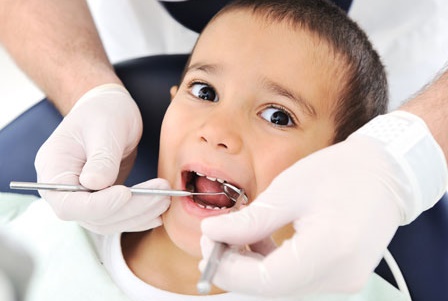Child's First Visit to the Dentist
When should my child first see a Dentist, and why?
The
Indian Dental Association(IDA) recommends that the ideal time for the
child to see a dentist is at approximately one year of age. This is an
ideal time for the dentist to carefully examine the development of your
child's mouth, because dental problems often start early, the sooner the
visit the better.
To safeguard against problems such as baby
bottle tooth decay, teething irritations, gum disease, and prolonged
thumb-sucking, the dentist can provide or recommend special preventive
care.

How do i prepare my child and myself for the visit ?
Very
young children may be fussy and not sit still. Talk to your child about
what to expect, and build excitement as well as understanding about the
upcoming visit. Bring with you to the appointment any records of your
child's complete medical history.
It is important to remember
that the dental health of baby teeth is very important as they not only
hold space for permanent teeth but they are important for chewing,
biting, speech and appearance.
What will happen on the first visit?
First
visits are introductory ice-breakers to acquaint your child with the
dentist and the clinic. If the child is frightened, uncomfortable or
non-cooperative a rescheduling may be necessary. Patience and calm on
the part of the parent and reassuring communication with your child are
very important in these instances. Short, successive visits are
meant to build the child's trust in the dentist and the dental office,
and can prove invaluable if your child needs to be treated later for any
dental problem.
A dental Check-up at this early age will:
- Allow your child to become familiar with the sights, sounds and smell of the dentist.
- Allow early detection of tooth decay and other dental conditions.
- Enable dental staff to give advice and instructions on tooth brushing and on good eating habits.
Appointments
for children should always be scheduled earlier in the day, when your
child is alert and fresh. For children under 2 years of age the parent
may have to sit in the dental chair and hold the child during the
examination. Also, parents may be asked to wait in the reception area so
a relationship can be built between your child and the dentist.
If the child is compliant, the first session often lasts between 15-30 minutes and may include the following, depending on age:
- A
gentle but thorough examination of the teeth, jaw, bite, gums and oral
tissues to monitor growth and development and observe any problem areas
- If
indicated, a gently cleaning which includes polishing teeth and
removing any plaque, tartar build-up and stains; X-rays; a demonstration
of proper home cleaning; assessment of the need for fluoride.
- The
dentist should be able to answer any questions you have and try to make
you and your child feel comfortable throughout the visit. The entire
dental team and the office should provide a relaxed, non-threatening
environment for your child.
What should i tell my child about the first dental visit?
- Take your child for a "preview" or online tour of our office.
- Read books with them about going to the dentist.
- Speak positively about your own dental experience.
- Allow your child to visit the dentist with you or with other older siblings.
- Do not use words such as drill and needle. The dentist will use special words to explain things.
- Talk about the good things about visiting the dentist such as counting teeth and learning how to care for them.
- Make the dental appointment an accepted part of regular routine. not a special event.
Is there anything else i need to to?
- Inform
the dental staff of any medical condition or past incident which may
affect your child's behaviour and ability to cope. This will allow the
dental team to adjust their approach.
- Accompany your child to the dentist.
- Be a passive observer, to enable dental staff to capture and hold your child's complete attention.
When should the next visit be?
Children,
like adults should see the dentist every six months. Some dentists may
schedule interim visits for every three months when the child is very
young to build up a comfort and confidence level, or to treat a
developing problem.
Five ways to protect your child's oral health at home
Parents
typically provide oral hygiene care until the child is old enough to
take personal responsibility for the daily dental health routine of
brushing and flossing. A proper regimen of home preventive care is
important from the day your child is born.
- Clean your infant's gums with a clean damp cloth. Ask your dentist if you may rub a tiny dab of toothpaste on the gums.
- As
soon as the first teeth come in, begin brushing them with a small soft
bristled toothbrush and a pea-sized dab of fluoride toothpaste.
- To
avoid baby bottle tooth decay and teeth misalignment due to sucking,
try to wean your child off of the breast and bottle by one year of age
and monitor excessive sucking of pacifiers, fingers and thumbs. Never
give your child a bottle of milk, juice or sweetened liquid as a
pacifier at nap time or bedtime.
- Help
a young child brush at night- the most important time to brush due to
lower salivary flow and higher susceptibility to cavities and plaque.
Perhaps let the child brush their teeth first to build self-confidence,
then the parent can followup to ensure that all plaque is removed.
Usually by age five or so, the child can learn to brush his or her own
teeth with proper parental instruction.
- The
best way to teach a child how to brush is to lead by good example.
Allowing your child to watch you brush your teeth teaches the importance
of good oral hygiene.